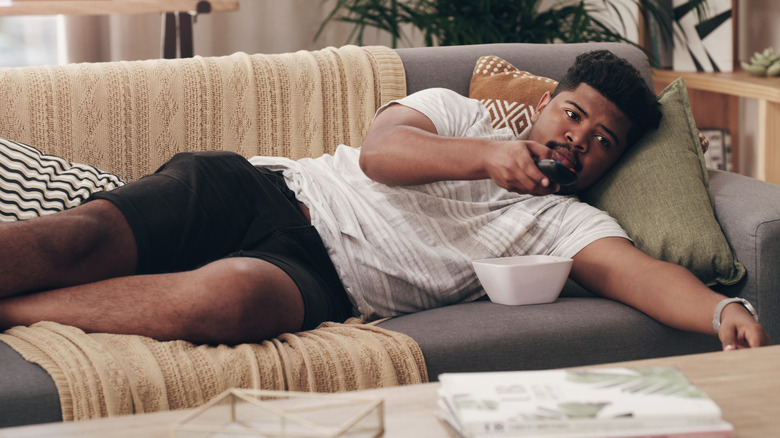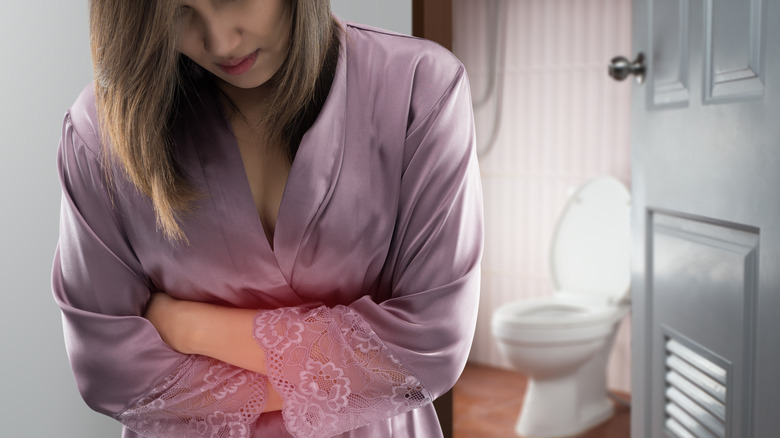Binge Watching TV Could Have An Unexpected Effect On Your Pee
Weekend warriors rejoice the moment the clock strikes 5 p.m. on a Friday. Finally, it's time to settle in for a new steamy season of "Bridgerton" or the comforting familiarity of "Law & Order: SVU." As the evening goes on, the episodes roll by one after the next. Relaxing as it may be, binge-watching a whole season of your favorite show in one sitting may potentially increase your risk for a urinary condition known as nocturia, according to the findings of a 2024 study published in Neurourology and Urodynamics.
If you're waking up for two or more bathroom trips a night, you may be experiencing nocturia. The condition isn't exclusive to older adults, either. Approximately 1 in every 3 adults over the age of 30 is affected by nocturia, and a large 70% of them report their symptoms as bothersome (via StatPearls). The condition can stem from a health condition or may be influenced by outside factors, including caffeine and alcohol consumption, a diet high in salt, or the use of diuretic medications later in the day. Researchers from the 2024 study, however, wanted to see if time spent in front of the television might also increase one's risk for nocturia. Here's what they found.
Spending too many hours in front of the TV may have you waking up to use the bathroom at night
The researchers gathered survey data dated from 2011 to 2016 using the National Health and Nutrition Examination Survey (via Neurourology and Urodynamics). The study involved a total of more than 13,000 adults, all of whom were at least 20 years of age. The research findings showed that people who spent the greatest amount of time watching television were 48% more susceptible to nocturia compared to those who spent less than 60 minutes in front of the screen each day. So how much screen time is too much screen time, exactly? According to the study, the high-risk participants were those who watched television or videos for five or more hours daily.
Five hours spent streaming may sound excessive, but for some Americans, it's the norm. 2022 survey data from CivicScience showed that out of more than 4,000 respondents, 13% said they watch television for four to six hours a day, and 9% watched TV for upwards of six hours daily. Granted, while we don't know whether these individuals were binge watching TV every day for six hours straight or in chunks, the research still seems to suggest that the fewer hours we spend watching TV, the better it may be for our bladder.
Certain health conditions may play a role in the link between nocturia and TV watching
If nighttime urination sounds like nothing more than a minor nuisance, know that nocturia has been associated with a number of other health conditions. In offering a possible explanation for the relationship between TV time and nocturia, the researchers noted that extended time spent watching television has been linked with type 2 diabetes, which increases one's risk of nocturia (via The Guardian). Staying stationary for long periods of time can also make one more vulnerable to peripheral edema, or fluid buildup in the legs, which could also potentially explain the connection between the two. Excessive TV watching might also increase the risk of certain neurological disorders that may impact normal bladder functioning.
Odds are, we're also drinking more fluids when spending a night on the couch. The later we stay up watching movies, the more our quality of sleep diminishes, which can also make us more prone to frequent nighttime bathroom trips. "As individuals increasingly engage in screen-based activities, a comprehensive understanding of the impact of extended TV and/or video time on patterns of nocturia is crucial for both healthcare professionals and public health practitioners," the authors wrote, as outlined in a press release.


